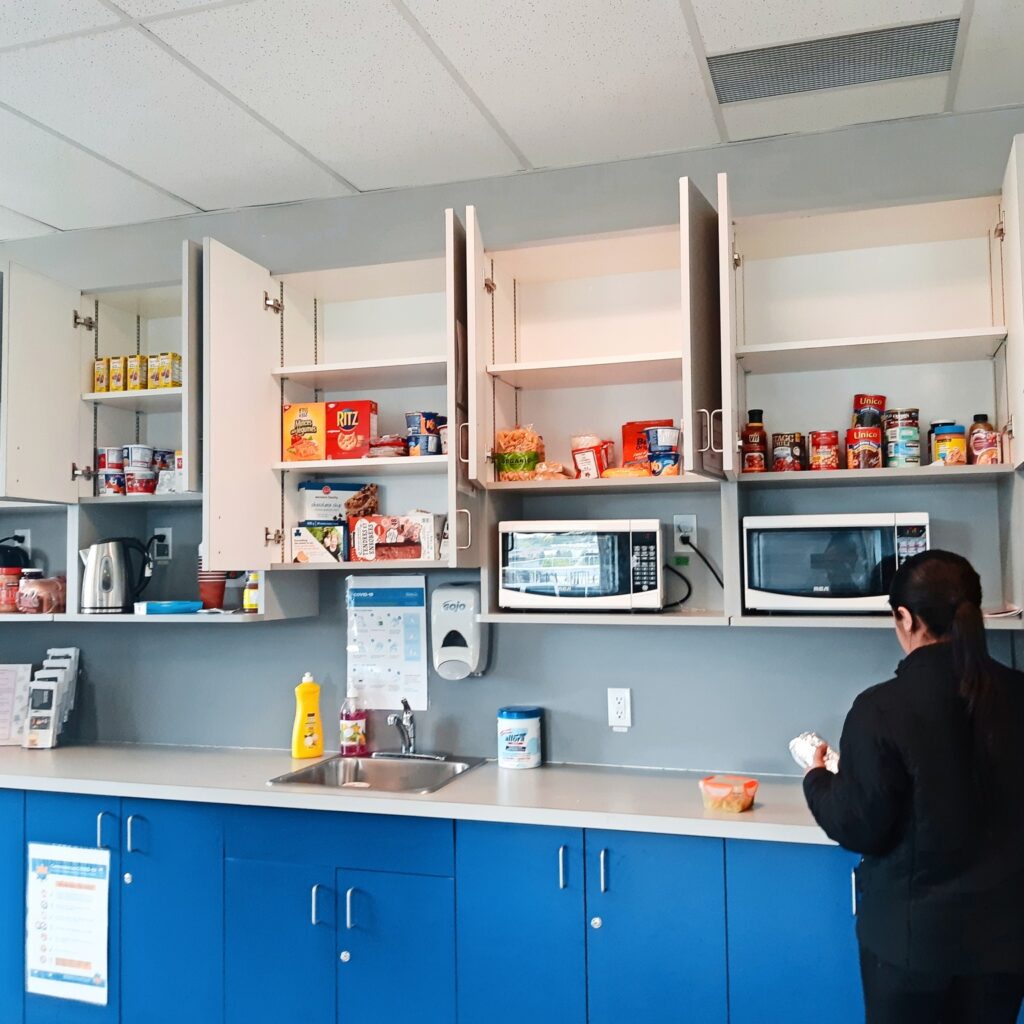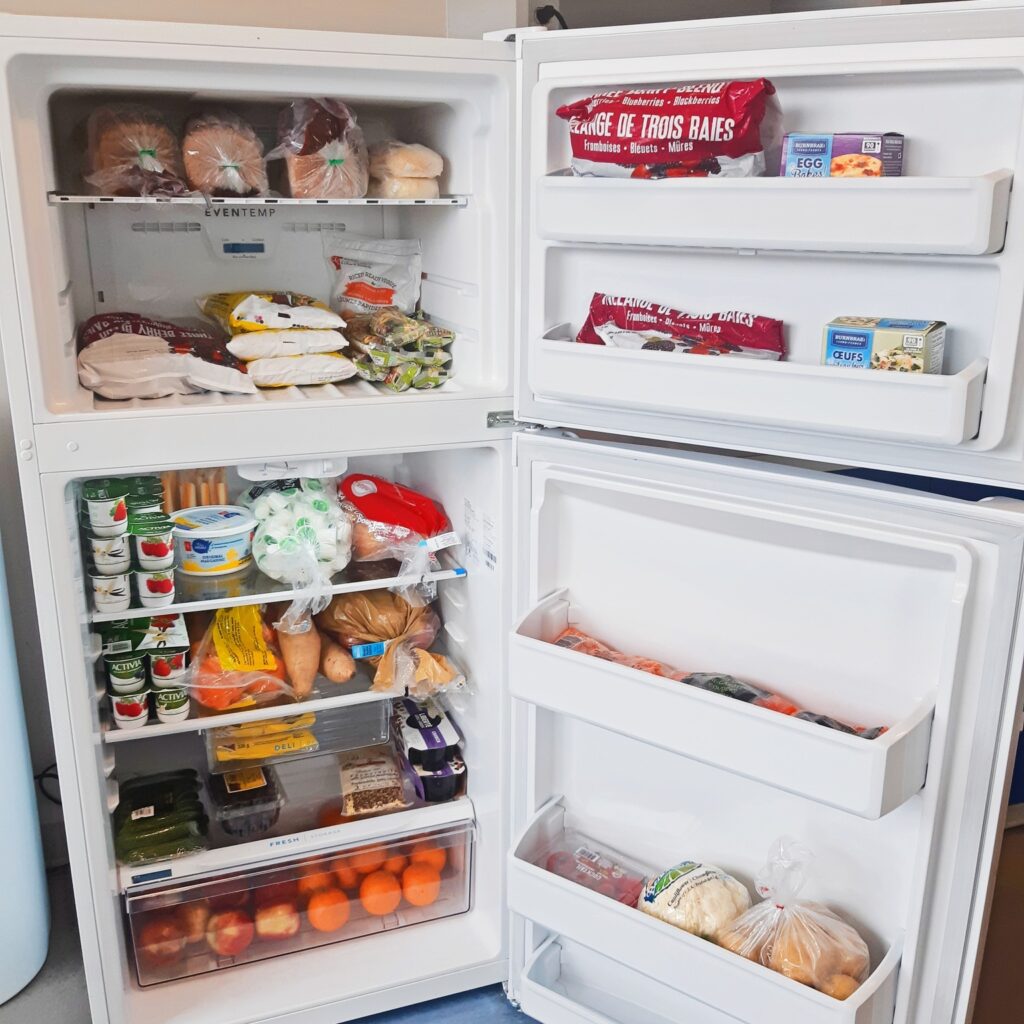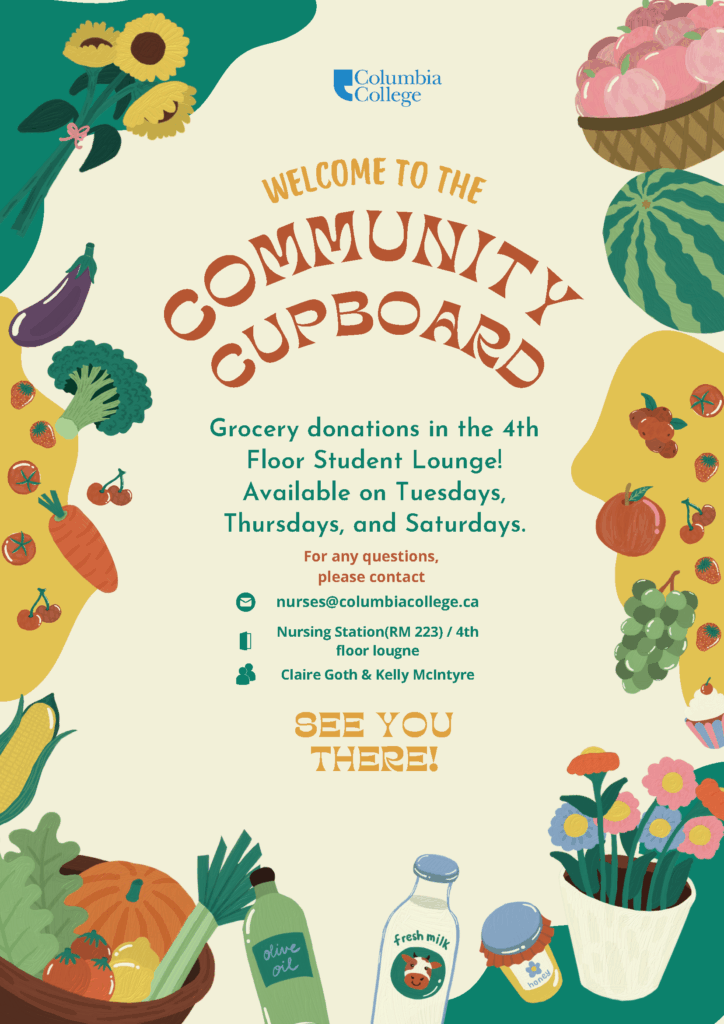General medical services are available to students at no charge.
First Aid Room and On-Campus Nurses
Currently Nurses are available in person and online via email and TEAMS for consultations with students. See us for a health assessment or if you have concerns about an illness or injury. We can help connect you with resources in your community, pass on nutritional advice, answer questions about medical insurance or help you to see a Doctor.
Main Campus, Rm 223
Monday – Wednesday: 9am-5pm
Thursday – Friday: 9:30am-5pm
Saturday: 9am-4pm
North Campus, Rm 403
Monday – Wednesday 9:30am-4pm
Our Nurses:
-
Claire Goth at cgoth@columbiacollege.ca
-
Kelly McIntyre at kmcintyre@columbiacollege.ca
Take home naloxone kits are available at the Nursing Station on the second floor. If the nurses are not available, please see the security desk on the ground floor.
Click here for more information about how to respond to opioid poisoning.
Click here for more information on substance use and staying safe.
Have questions? Contact our nurses at nurses@columbiacollege.ca
Seeing a Doctor in Canada
Reliable Medical Information: It is very important to find a trustworthy source of advice and information. Healthlink BC offers information about how to care for an illness or medical condition. If you have questions about what you have read or if you would like to speak with a live medical professional you can call 811, which is a service available 24 hours a day, to speak with a nurse or pharmacist.
- If you have GuardMe insurance? In an emergency if you need to be treated at a hospital you would explain that you are an international student with private insurance. Ask the hospital to send you an invoice for service. You do not need to bring your GuardMe policy sheet. Tell the hospital you will arrange for GuardMe to pay them directly. Once the invoice arrives by mail, submit a claim to GuardMe online. In Canada you do not have to pay first before receiving emergency medical care.
- If you need to see a Doctor and it is not an emergency, you can book an online appointment at no additional cost through Mobile Doctor: https://www.guard.me/columbiacollege/mobileDOCTOR Before you book, make sure to have your policy number ready. Set up your account and find your policy number here: https://www.guard.me/columbiacollege/myaccount You can also see a Doctor in a community clinic near your home. You will need to pay first ($100-$500) depending on the clinic, then you will be able to submit a claim for reimbursement here: https://www.guard.me/columbiacollege/myaccount
- If you have MSP? When you go to see a Doctor in a clinic or hospital, bring your MSP B.C. Services card with you and show the number (PHN) on the back of the card. This allows you to receive medical services with no upfront cost.
When you need to see a Doctor for something that is not urgent, like a prescription renewal or general health consultation.
Find a Walk-In Medical Clinic near me | Medimap – Always call first to confirm availability.
Map Search – Find a Doctor BC - Use the filter to look for “walk in” clinics and always call first to make sure they are available.
If you need urgent, same day care, consider an Urgent and Primary Care Centre. (UPCC)
For more information on UPCCs and to find out if there is a location close to you, see Urgent and Primary Care Centers.
Home – Emergency Department Wait Times The Emergency Room (ER) in hospitals can be very busy, especially during the holidays. For those with non emergency health questions or concerns, there are better options then visiting an ER.
Always go to the ER if you have been in a major accident or for potentially life-threatening symptoms. When to visit the emergency room | HealthLink BC
Other Medical Care in Canada
A pharmacy is a place where medicinal drugs are dispensed and sold. They are often located close to medical clinics. Prescription and non-prescription medications can purchased from a pharmacy. You can also ask a pharmacist for advice and information about home care treatments for minor ailments such as cold, flu, headache, upset stomach, cuts and scrapes.
Optometrists perform routine vision testing, prescribe eyeglasses and contact lenses, detect vision problems and eye disease, refer to specialists, prescribe medicines to treat some diseases of the eye, and provide care before and after eye surgery. Routine eye exams are not covered under your Medical Services Plan (MSP) but with your Guard.me insurance plan you are covered up to $125 for an annual vision health test. If you have questions or concerns about your eye health speak with the nurse.
Good preventative oral care such as flossing once and brushing twice a day with a soft bristle toothbrush is very important to maintaining good physical health. Drink water to help dilute the acids in your mouth and protect teeth from cavities. Limit beverage choices like sports drinks, coffee, diet sodas, or regular sodas as they may increase the chances for tooth decay. Routine dental checkups are not covered under your Medical Services Plan (MSP) or Guard.me plan. If you have questions or concerns about your dental health find a dentist or see the nurse for a list of lower cost dental clinics in your area.
Opt clinics provide non-judgmental birth control counselling and low cost contraceptives and supplies, sexually transmitted infection (STI) and Pap testing, pregnancy testing, options counselling, and general sexual health information and referrals. Services are offered for all ages, genders, and orientations. Call 604-731-7803 or visit www.optionsforsexualhealth.org
Staying free of disease and illness is another great way to feel good and stay physically well. Learn more about immunizations that are recommended in British Columbia.
Other Physical Health Resources
Juggling classes, assignments, studying, a social life and maybe even a part-time job while managing a tight budget is a definite challenge. Start the school year strong by making healthy eating a priority. Consult the Canada Food Guide. Eating well will fuel your mind and body to help you with your schoolwork, maintain a healthy weight, and keep your body strong to fight off germs.
The South Asian Health Institute (SAHI) was established to improve the health for South Asian people through innovation and evidence-based strategies. We understand the importance of culture and its impact on health, and aim to reduce chronic disease burdens as well as other emerging health issues for people in the South Asian community. https://www.fraserhealth.ca/health-topics-a-to-z/south-asian-health/south-asian-health-institute#.Ypp5tqjMKUl

According to the Canadian Society for Exercise Physiology, to achieve the health benefits from exercise people age 18 – 64 should accumulate 150 minutes of moderate to vigorous physical activity per week. The Physical Activity Line (PAL) is British Columbia’s primary physical activity counselling service and your FREE phone line and online resource to active healthy living. Call 811 with questions about fitness.
It is so important for you to get enough sleep before class. Adequate sleep helps to improve your memory, concentration, and motivation. When you are chronically tired the tasks of the day ahead seem unmanageable. You may find yourself making poorer choices that do not benefit your health and wellness. To figure out how much sleep you need to feel alert and energized in your day try using the Sleepyti.me bedtime calculator.
Columbia College is committed to promoting and maintaining a healthy and safe working and learning environment where all members of the Columbia College community are protected from exposure to smoking and tobacco use on all college campuses and properties. For more information please view the Smoke-Free Campuses policy on the Policies page.
Columbia College Community Cupboard (CCCC)


The Columbia College Community Cupboard (CCCC), a collaborative initiative with local non-profit organizations, offers healthy groceries for students. The cupboards are restocked on Mondays, Thursdays, and Saturdays, and students can access them while supplies last without prior registration. Alternatively, students can contact the CC Nurses at Student Services for additional food options.
More information on the Columbia College Community Cupboard (CCCC) can be found here.


